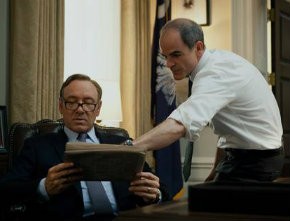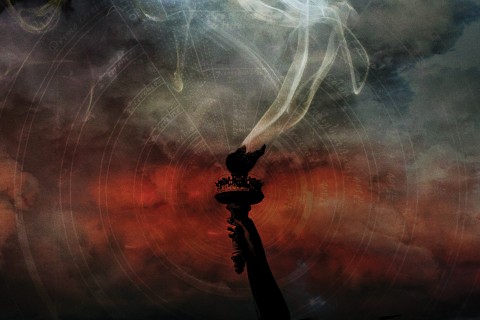House of Cards has become a less funny, even less realistic The West Wing

So I got through the latest season of House of Cards, in which scheming politician Frank Underwood is finally president. I won’t quite say I enjoyed most of it; it was just that thing where you’re motivated to stick with a show once you’ve started it. Alessandra Stanley articulates the conventional wisdom: House of Cards is less fun now that Underwood is the most powerful person in the world, because governing is less interesting to watch than jockeying for power is.
Maybe. But this doesn’t really account for the counterexample of The West Wing. That show had a little backstage intrigue and, later on especially, a good bit of campaigning. Its bread and butter, however, was governance—including quite a lot of policy and procedural detail. And even at its weakest it was almost always more fun to watch than House of Cards.
Now, every show about national politics brings to mind The West Wing as a point of comparison and, especially, contrast. But if The West Wing has a true antithesis, House of Cards is it. Both shows are obsessed with presidential power, prestige, and glamour. But while the one is an optimistic, patriotic romance (on network), the other is a far darker Washington dystopia (on Netflix). Two brilliant presidents, one who inspires like a proper network-drama hero, another who horrifies like the late-period cable antihero he more or less is. Based on that summary alone, The West Wing’s advantages are obvious: more feels, less murder.
What’s weird is that House of Cards doesn’t really deliver on the other side of the ledger. You’d expect it to be tougher minded about politics, or more ambitious in its approach to narrative, or more shockingly funny, or more something. And it mostly just isn’t. The show’s power machinations are diabolical but too broadly drawn to offer much insight; its public policy elements are laughably simplistic. There’s a bit of wryness here—Kevin Spacey can deliver a burn—but almost no real laughs. It’s visually stylish, sure, but even this loses something this season, with the endless scenes of tense conversations in the Oval Office or the Executive Residence. It’s almost enough to make you miss the walk-and-talk.
To be sure, The West Wing had its faults. Just for starters, its close attention to process offered civics lessons but not especially realistic ones, while its policy substance tended toward the bland moderation of, well, a neoliberal Clintonite show in pursuit of bipartisan Nielsen ratings. It was never quite as bold or as fresh as it seemed to want us to believe.
Free of network constraints, in TV’s new golden era of blah blah blah, you’d like to expect House of Cards to excel where The West Wing fell short. Instead it’s even worse. We get a president trying his damnedest to govern…by putting all his weight behind a pair of politically impossible ideas (an ambitious jobs program, cuts to Social Security and health care) that would amount to roughly a wash for the well-being of low-income Americans. It’s a new New Deal, or just a different bad one—it doesn’t matter much, because public policy is just a thin device here, a prop in the story of Frank Underwood.
On The West Wing, there would have been an informative debate about the policy give and take, with lots of nerd stuff and a couple good jokes. Yes, then the president would have pushed the thing through Congress with a ridiculous speech over a swelling soundtrack. Still.
Here’s what I’d like to see: a show about government that focuses on the day-to-day grind of trying to improve people’s lives by inches. No big speeches, no Machiavellian schemes, just a show that downplays the mystique in favor of the reality: a job—important but not always exciting, high-minded at times and less so at others—that has the scale to make a huge difference, for better or for worse.
Parks and Recreation, which recently ended its run, got close to this at times, but always in the context of what was essentially a goofball comedy. What I’d like to see is something dramedic and detailed like The West Wing but lower key and truer to life, a Rev. for government work. When it comes to government, after all, Americans’ opinions are a lot stronger than our understanding. House of Cards does little to help this. Which would be easier to forgive if it wasn’t also kind of dull.






